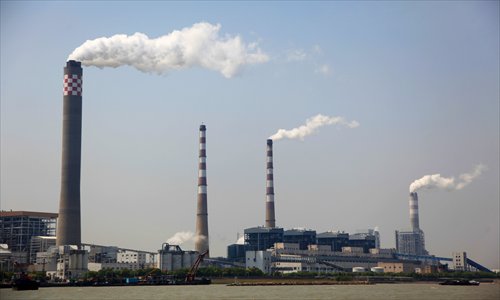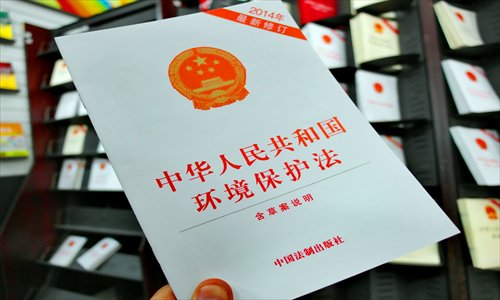New law allows NGOs to pursue legal action against environmental offenders
Granting some NGOs the legal standing necessary to sue polluters, the revised version of China's Environmental Protection Law is expected to allow social organizations to play a bigger role in fighting environmental crimes. The high cost of litigation and the interference of local governments, however, will pose challenges to these eco-warriors.

A coal-fired power plant operates next to the Yangtze River. The plant, located in Changshu, East China's Jiangsu Province, began to generate power in 1994. Photo: CFP
It used to be a mountain covered with lush forests, but after three businessmen bought the area in Nanping, East China's Fujian Province in 2008, the 13,000 square meters of forest were soon turned into a desolate wasteland through illegal quarrying.
On January 1, the day China's new, stricter environmental law came into effect, the Chinese environmental non-governmental organizations (NGOs) Friends of Nature and Fujian Green Home Environmental-Friendly Center received notice from the Nanping Intermediate People's Court that it would hear a case jointly filed by the two organizations against polluters in Nanping.
This was the first public interest litigation filed by NGOs in China after the new law took effect.
"We're happy that the case was heard at the beginning of the new year, thanks to the new environmental law which makes the legal process clearer," Zhang Boju, secretary-general of Beijing-based Friends of Nature, told the Global Times.
The NGOs filed a lawsuit against polluters who they say are responsible for unauthorized quarrying activities and waste soil and stone dumping in Nanping between 2008 to 2010, which the NGOs claim severely damaged the local environment.
"We ask the polluters to restore the vegetation in the polluted area," said Ge Feng, a member of a legal team with Friends of Nature.
After three years of legal wrangling and four formal drafts, China finally adopted a revised version of its Environmental Protection Law this year, a law which hadn't been changed since it was first enacted in 1989.
It is widely regarded as the strictest environmental law enacted in the country to date, granting environmental authorities more power to punish polluters and allowing NGOs to file lawsuits against them.
"The new law has granted NGOs all the legal weapons required to bring lawsuits in the public interest, and it is now up to the NGOs to make use of these weapons," Zhao Liang, a research fellow at the Beijing-based environmental NGO Nature University, told the Global Times.

The copy of the newly adopted Environmental Protection Law is sold in a book store on January 1 in Yichang, Central China's Hubei Province. Photo: CFP
More lawsuits, more fines
Before the new environmental law came into effect, Friends of Nature and Green Home might not have been able to sue these polluters.
The Civil Litigation Law, the law that governed such cases before the revised environmental law was enacted, only allowed "relevant organizations" to initiate environmental public interest lawsuits, and it was up to local courts to interpret who qualified as "relevant."
In reality, while NGOs have been making attempts to file environmental public interest cases for many years, they have often been shut out by the courts, which were unwilling to grant them the legal standing necessary to file these kinds of cases.
From 2000 to 2013, only about 50 environmental public interest lawsuits were heard in China, the majority of which were filed by government administrative or legal departments, according to a report by the State-sponsored All-China Environmental Federation.
"We filed eight lawsuits in 2013 alone, and none was heard by the courts due to our legal status," Ma Yong, deputy director at the federation's Environment Law Service Center, told the Global Times.
The new law gives a much more specific definition of what kind of organizations may file public interest environmental cases than the ambivalent definition given in the civil litigation law.
According to the new law, social organizations will be eligible to pursue lawsuits if they are registered with civil affairs departments at the prefecture level or above, have been active in environmental public interest activities for at least five years and have no illegal offenses on their record.
Among the 7,000 environmental NGOs that are currently registered with local and central governments in China, over 700 are now eligible to launch public interest lawsuits, Liao Hong, a Ministry of Civil Affairs official, said during a press conference in December 2014.
Although some environmental experts put that number at 300, changes are already taking place. Friends of Nature and Green Home are not the only NGOs that have had confirmation that their cases against polluters will be heard.
On January 13, the All-China Environmental Federation filed two lawsuits at the Shandong's Dongying Intermediate People's Court against polluters in Zhejiang and Shandong provinces, and received notice the same day that their cases would be heard.
Yang Xiumei, chief judge at the environment court at Shandong's Dongying Intermediate People's Court, told the Global Times that these are the first pieces of public interest litigation filed by an NGO that the court has accepted since it was founded in 2012.
"The new law makes it easier for the court to decide if the plaintiff has the right to file lawsuits," Yang said.
Local environmental protection bureaus are also playing a role in these lawsuits. In the All-China Environmental Federation's case against Zhejiang's Xin'an Chemical Industrial Group, which delivered pollutants to Dongying to discharge them, Dongying's environmental protection bureau will act as a supportive prosecutor.
"This is the first case where a local government organization will act as a supportive prosecutor in a public interest litigation case after the new law was enacted," Yang said. "The environmental protection bureau will provide technical and statistical support during the trial."
To complement the new law, the Supreme People's Court (SPC) issued its first judicial interpretation of the year, its long-anticipated environmental public interest litigation interpretation, on January 6. The interpretation will provide further institutional guidance regarding public interest litigation.
On December 30, two days before the new law took effect, a court in Taizhou, East China's Jiangsu Province, ordered six companies to pay a fine of 160 million yuan ($25.7 million) following a successful environmental public interest lawsuit brought by the All-China Environmental Federation. The fine is the biggest ever given in a Chinese environmental pollution case and many took it as a signal that Chinese officials are now serious about cracking down on polluters.
But Ma said the verdict might just be an isolated incident. "It shows the local government has resolved to punish the companies. But I doubt the same thing will happen in Beijing, Hunan or Hubei," he said.
The high price of justice
While the new law and the SPC's relevant interpretation clarified the legal criteria that must be met for NGOs to file public interest lawsuits, challenges still remain. The high cost of litigation, for example, has been one thing that has prevented NGOs taking action.
According to the latest judicial interpretation, the cost of litigation can be passed to the losing party, but the uncertainty around whether a case will be heard or not and the long litigation process often makes filing cases risky and potentially very expensive for NGOs.
"This has been a major challenge. It's difficult for environmental NGOs, especially those without any government backing, to afford investigation, evidence collection, pollution reports and legal fees," Zhang said.
This is why Friends of Nature set up China's first fund to support public interest environmental litigation on January 1, with the support of the Alibaba Foundation, an environmental foundation launched by Chinese e-commerce giant Alibaba.
The 300,000 yuan fund will offer financial support to organizations that want to file lawsuits in the public interest and do not have the resources to do so.
"The cap for each lawsuit is 80,000 yuan, which is the approximate cost for the preparation of a case. If an NGO, with the support of the foundation, wins the lawsuit, the refunded legal costs will go into the fund and be used to support other cases in the future," Zhang said.
Another challenge lies in the NGOs' professionalism in terms of their ability to collect and present legal arguments and environmental data.
"Whether or not a lawsuit can be filed and won successfully is a test of an NGO's technical and legal competency and internal management," Jia Xijin, deputy director at Tsinghua University's NGO Research Center, told the Global Times.
To boost the competency of NGOs, Jia suggested forming partnerships between NGOs and other academic and technical organizations.
The partnership between Friends of Nature and Green Home, for example, combines the years of experience of litigation at the national level, brought by the Beijing-based Friends of Nature, and the local knowledge provided by Green Home, located in Fujian where the pollution allegedly occurred.
"If an NGO is unable to pool various resources and use them effectively, it will be very difficult for them to win in court," Jia said.
Political protectionism
How effective the new law is also depends on local governments, which are known to protect polluters due to their contribution to local economies in terms of tax revenue and employment.
"As far as I can see, local protectionism will remain an important impediment to the just resolution of environmental claims for a long time. The new law will not resolve this problem," Zhao Liang from NGO Nature University told the Global Times.
To fight against the interference of local officials, the newly released SPC judicial interpretation says that with the approval of the SPC, higher people's courts can appoint special intermediate people's courts within their jurisdiction to hear environmental law cases. But it remains unclear to what extent this provision can be implemented in practice.
"Learning how to translate the law into action will take time. It's a test of the capability and willingness of local governments and legal departments to develop and enforce the law," Ma Yong, of the All-China Environmental Federation, told the Global Times.
"But we still need to try. The law has endowed us with the right to file lawsuits and it's up to us to try the law ourselves and push it," Zhao said.
Newspaper headline: Prosecuting the polluters